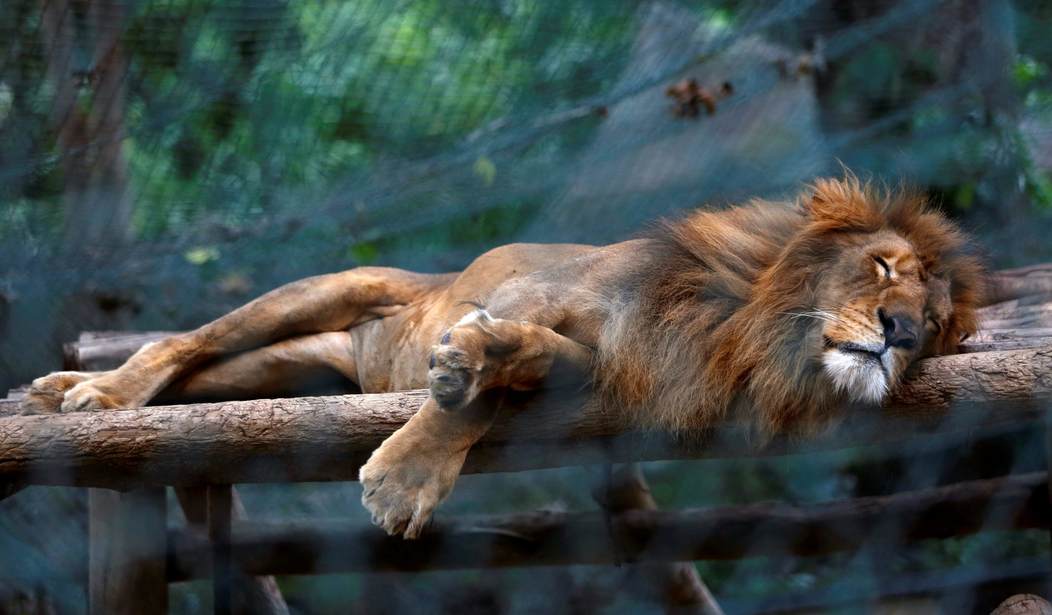At least 50 animals have died in the last six months at the Caricuao zoo in Caracas, Venezuela, due to widespread food shortages that are affecting both man and beast in the socialist nation.
Marlene Sifontes, a union leader for employees of state parks agency Inparques which oversees zoos, told Reuters that the zoo lost Vietnamese pigs, tapirs, rabbits and birds after the animals went weeks without eating. Others animals at the zoo are in danger of severe malnutrition. Lions and tigers, which should be on a carnivorous diet, are being fed mango and pumpkin just to get something in their empty stomachs, while an elephant is being fed tropical fruit instead of its usual diet of hay, the union leader said. According to one report, the big cats are being fed slaughtered thoroughbred racehorses from a nearby race track.
The tweet below reportedly shows a picture of one of the tapirs that died of starvation at the Caricuao zoo. The English translation: “Danta from the Caricuao zoo died from hunger according to info sources from the institution. Another in bad conditions.”
Danta del zoológico de caricuao murió por hambre según informan fuentes de la institución.otra en malas condiciones pic.twitter.com/9alPFGfiwT
— FranciscoUrreiztieta (@FUrreiztieta) June 30, 2016
“Other animals suffer from hunger in the Caracas zoo,” the tweet below says. “The bison is so weak that it is being pecked at by turkey buzzards.” Turkey buzzards — we call them turkey vultures in the U.S. — usually only eat dead animals and they prefer decomposing carcasses, which gives you an indication of the poor condition of this bison.
Otros animales sufren por el hambre en el zoo de Caricuao. Este bisonte está tan débil que es picado por zamuros pic.twitter.com/Gpmmjvb3nL
— FranciscoUrreiztieta (@FUrreiztieta) July 11, 2016
“The story of the animals at Caricuao is a metaphor for Venezuelan suffering,” Sifontes said.
Next page: What about other zoos in Venezuela?

An Andean bear stretch its claw inside a cage at the Paraguana zoo in Punto Fijo, Venezuela July 22, 2016. REUTERS/Carlos Jasso
National Review’s Jose Cardenas summarized a New York Times article describing life in the socialist utopia:
The examples cited by the Times are dramatic: babies dying in maternity wards, lack of water to wash blood from operating tables, surgeons forced to wash their hands with bottles of seltzer water. “It is like something from the 19th century,” one doctor told the Times. Another: “There are people dying for lack of medicine, children dying of malnutrition and others dying because there are no medical personnel.” The easily preventable deaths of innocents is tragic, but it is only one more ghastly layer atop Venezuelans’ increasingly brutish quality of life. Added to this are levels of street crime among the world’s highest; shortages of the most basic goods, leading to hours-long queues and looting; triple-digit inflation, which has resulted in more than 70 percent of the population’s living in poverty; and the collapse of government services exacerbated by the two-day work week, ordered by Chávez’s hapless successor, Nicolás Maduro, to save energy.
Amnesty International reported this week that Venezuelan President Nicolas Maduro issued a decree that could force workers to leave their jobs to work in the fields. In other words, the Maduro government essentially just decreed government-sanctioned slavery (for the common good of course).
The situation is very grim for the humans in Venezuela, so it’s no wonder that animals are not being properly cared for. The situation is even worse for animals outside the capital.
In the western state of Tachira, a park called La Laguna is seeking donations of fruit, vegetables and meat from local businesses so they can feed their animals.
“We are doing all that is humanly possible to ensure the zoo continues to function,” Oslander Montoya, an accountant for city which handles the zoos funding, told Reuters.
In Paraguana, on the northwestern Falcon peninsula, three animals have died at a zoo there since the food shortages began.
The director said staff there are planning to move a dozen animals to another park so they can receive better care. Their collection includes six vulnerable spectacled bears, which are currently receiving just half of their required 35.2 pounds of food per day.
Meanwhile, the people of Venezuela regularly go without food and many have begun hunting dogs cats, and pigeons so they can feed their families. And last week prosecutors say someone broke into the Caracas zoo and stole a horse that they later butchered for food.










Join the conversation as a VIP Member